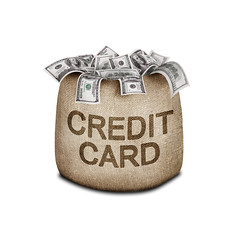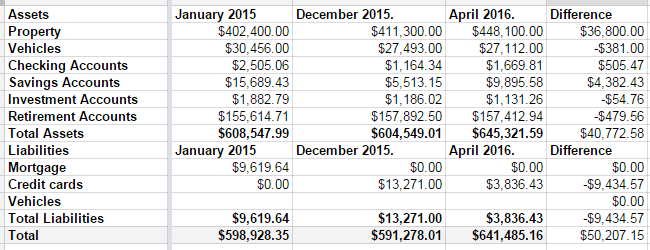- RT @mymoneyshrugged: The government breaks your leg, and hands you a crutch saying "see without me, you couldn't walk." #
- @bargainr What weeks do you need a FoF host for? in reply to bargainr #
- Awesome tagline: The coolest you'll look pooping your pants. Yay, @Huggies! #
- A textbook is not the real world. Not all business management professors understand marketing. #
- RT @thegoodhuman: Walden on work "spending best part of one's life earning money in order to enjoy (cont) http://tl.gd/2gugo6 #
Check Your Bills
Today, I discovered our AOL billing information. Turns out we’ve been paying for dial-up via automatic bill paying that we thought we cancelled in 2000. $1,800 later, we called to cancel. Customer service congratulated us on being loyal members for over 13 years. FML -Jay

- Image by roberthuffstutter via Flickr
I am a huge fan of automating my finances. My paycheck is direct-deposited. My savings are automatically transferred from my checking account to my savings account. Almost every bill I receive regularly is set up as an automatic payment in my bank’s bill-pay system. I even have my debt snowball automated.
The only question left is whether it’s possible to automate too far. Can you automate past the point of benefit, straight into detriment? The primary benefit of automation is knowing that you can’t forget a payment. The other benefit is freeing up your attention. You don’t have to give any focus to paying your bills, freeing you to worry about other things.
The problem with the second benefit is the same as the benefit. If you don’t give your bills any attention, how do you know if there is a problem? If something changes–an extra fee or a mis-keyed payment–you won’t notice because you haven’t been giving the bills any focus.
Sometimes, this means you are paying an extra fee without noticing it. Sometimes, if your due date changes, it can mean late fees. Even if nothing goes wrong, you are missing the opportunity to review what you are paying to ensure your needs are being met as efficiently as possible.
What can you do about it? I put a reminder on my Life Calendar to check my bills each month. I pick one bill each month and try to find a way to save money on it. I review the services to make sure they are what I need and if that doesn’t help, I call and ask for a lower price. If it’s a credit card, I ask for a lower interest rate. For the cable company, I ask if they will match whatever deal they have for new customers.
Every company can do something to keep a loyal customer happy. All you have to do is ask.
Do you automate anything? How do you keep track of it all?
Back to Cash
It appears that I can’t be trusted with a credit card.

At least, not a credit card that gets used for our regular shopping.
Over the past few months, our spending has slipped past our budget by more than I like. The problem appears to be that it’s really easy to toss “just one more thing” in the cart when there’s no hard limit on how much is available to spend at the register.
If you do that a few time, it’s easy to find yourself $1000 over budget.
Ouch.
If it weren’t for my side hustles, we’d have been growing our debt recently.
As of the beginning of this month, our credit card has once again been relegated to automatic bills, the gas station and online purchases.
No more groceries, no more scrapbooking stuff, and no more restaurants.
I would have done this sooner, but we were so far over budget that I didn’t have the cash to yank out all at once to cover our month’s expenses. We ended last month at a good place, so I went for the clean break and withdrew all of our day-to-day spending on the first. When I got home, it went straight into envelopes so we know what we’ve got to spend this month.
Bye-bye, credit cards!
Regret
There comes a time when it’s too late to tell people how you feel.
There will come a day when the person you mean to talk to won’t be there. Don’t wait for that day.
“There’s always tomorrow” isn’t always true.
The Luxury of Vacation
This was a guest post I wrote last year to answer the question posed by the Yakezie blog swap, “Name a time you splurged and were glad you did.”
There are so many things that I’ve wanted to spend my money on, and quite a few that I have. Just this week, we went a little nuts when we found out that the owner of the game store near us was retiring and had his entire stock 40% off. Another time, we splurged long-term and bought smartphones, more than doubling our monthly cell phone bill.
This isn’t about those extravagances. This is about a time I splurged and was glad I did. Sure, I enjoy using my cell phone and I will definitely get a lot of use out of our new games, but they aren’t enough to make me really happy.
The splurge that makes me happiest is the vacation we took last year.
Vacations are clearly a luxury. Nonessential. Unnecessary. A splurge.
When we were just a year into our debt repayment, we realized that, not only is debt burnout a problem, but our kids’ childhoods weren’t conveniently pausing themselves while we cut every possible extra expense to get out of debt. No matter how we begged, they insisted on continuing to grow.
Nothing we will do will ever bring back their childhoods once they grow up or—more importantly—their childhood memories. They’ll only be children for eighteen years. That sounds like a long time, but that time flies by so quickly.
We decided it was necessary to reduce our debt repayment and start saving for family vacations.
Last summer, we spent a week in a city a few hours away. This was a week with no internet access, no playdates, no work, and no chores. We hit a number of museums, which went surprisingly well for our small children. Our kids got to climb high over a waterfall and hike miles through the forest. We spent time every day teaching them to swim and play games. Six months later, my two year old still talks about the scenic train ride and my eleven year old still plays poker with us.
We spent a week together, with no distractions and nothing to do but enjoy each other’s company. And we did. The week cost us several extra months of remaining in debt, but it was worth every cent. Memories like we made can’t be bought or faked and can, in fact, be treasured forever.
Net Worth, April 2016

Last year wasn’t a good year for my net worth. It came with a $7000 drop.
Q1 2016, however, was a great quarter.
In December, we had $13,271 in credit card debt. At the time I took this screenshot, it was down to $3836.43. As of this moment, it’s down to $2640.91. If things go as expected this week, I should wake up on Friday to a paid-off credit card. I had to raid some of our savings accounts to make it happen, but it’s happening. Some of it was a tax refund, some of it was the fact that my mortgage payment went away in December.
That’s seven years of hard work, almost to the day. Seven years ago, I was researching bankruptcy, and stumbled across Dave Ramsey. Seven years ago, we were drowning in debt.
Next week, we’re free. No more debt, hanging over our heads. We’re free to take vacations. We’re free to finally save for college, when my son is 16, and stand a chance of being able to pay for it for him. We’re free to do…whatever we want to do. Our monthly nut after the debt is paid–only in fall/winter/spring when my wife is working–is roughly 1/3 of our take-home pay.
That’s how hard we’ve cut to make sure we can pay our bills and make debt die. We do have some things that would be considered extravagant. We’re not savages. But my car is 10 years old. My wife’s is 7. My motorcycles are 35 and 30; one of them was purchased before we cared about our debt.
Back to the net worth….
The biggest change came from our property values, which sucks. That was $36,000 of the difference, which comes with the painful tax bump to go with it. A large chunk of the savings increase was the money we set aside every month to cover the property tax bill, and that will go away next month.
Still, $641,000 dollars is a long way from nothing. I’m pretty happy.

